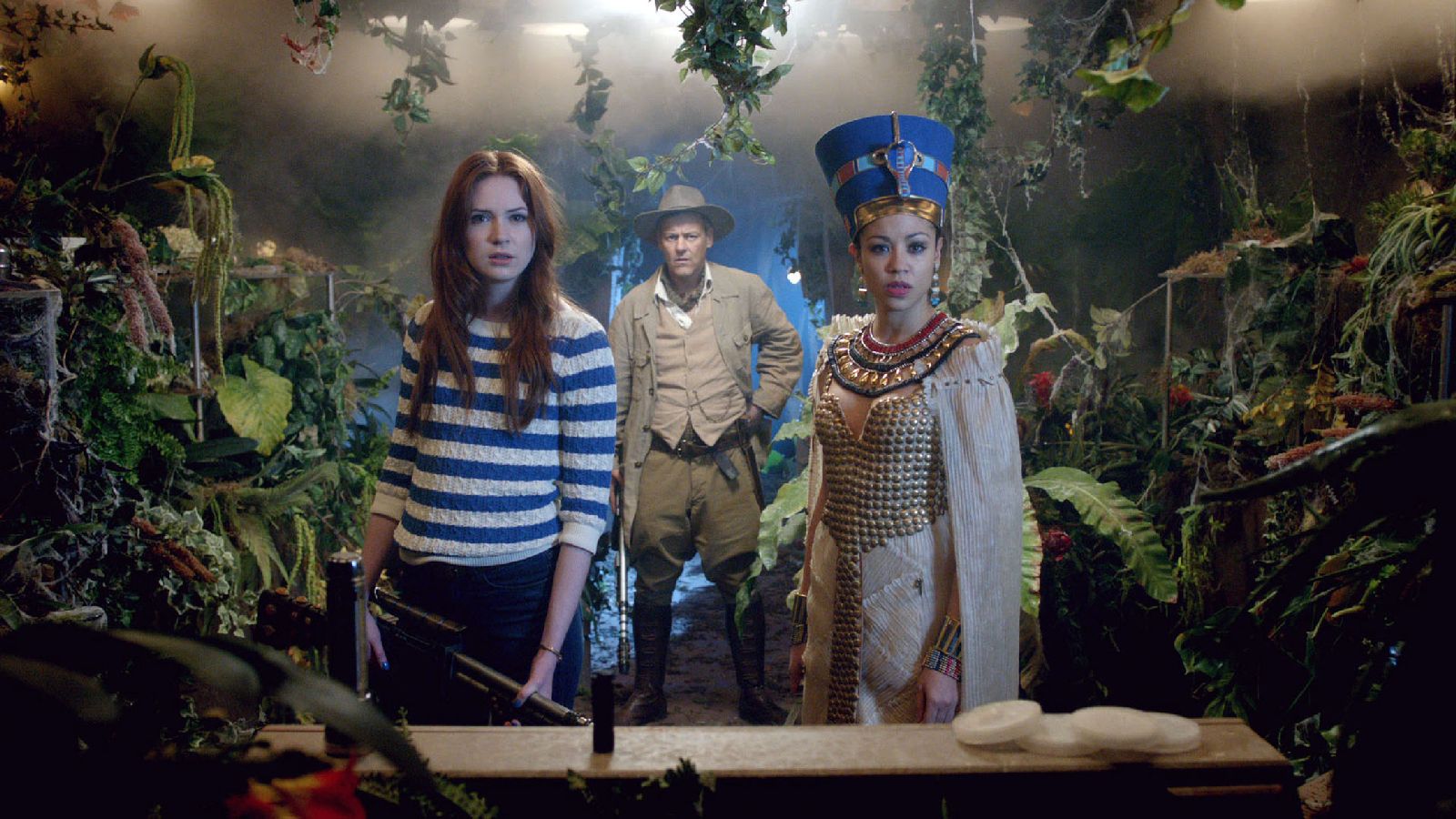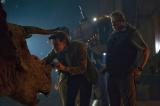Doctor Who: Dinosaurs on a Spaceship

Doctor Who - Dinosaurs on a Spaceship
Written by Chris Chibnall
Directed by Saul Metzstein
Broadcast on BBC One - 8 September 2012
This review contains plot spoilers and is based on the UK preview of the episode.
It's impossible, when discussing a series placed in as many currents of criticism as Doctor Who, to isolate one's own impressions of an episode from the expectations and apprehensions which have been entangled in the threads of the internet. An episode written by Chris Chibnall raises particular concerns. Over the past few years, Chris Chibnall has come under attack for sexism (Torchwood's Cyberwoman especially), lack of moral compass (Malokeh's experimentation on sentient beings in Cold Blood, and the apparent endorsement of the Ood's slavery in Pond Life), inconsistent characterisation (Malokeh again, but also several Torchwood character arcs) and absence of a distinctive authorial voice. In such a context, Steven Moffat's recent praise for Chibnall's writing talent echoes Tony Blair's plea to a sceptical Labour Party that it must learn to love Peter Mandelson. For the leadership, Chibnall's involvement seems essential, but for many of the faithful his work undermines the foundations of Doctor Who.
Dinosaurs on a Spaceship, then, has considerable obstacles to overcome in the face of the entrenched attitudes of Chibnall's critics. Some overlook the essentially collaborative nature of television production and blame Chibnall for aspects over which he had no control, such as costume (controversial in both Cyberwoman and The Hungry Earth/Cold Blood). It's perhaps relevant that the amendments to the title sequence for this series include reverting to the 'Written by…' credit abandoned during The Gunfighters, an important qualification to the claims of the scriptwriter to the whole. For others, Chibnall is to blame for saddling productions with undeliverable concepts.
The title is the most stratospheric of high concepts. It obviously parodies Hollywood gimmickfest Snakes on a Plane (of which I know little), thereby courting one set of pop cultural expectations. These are met by the impressively cinematic variations in scale Saul Metzstein and his team realise, from the intimacy of the Ponds' front room, the claustrophobia of the spacecraft cockpits, to the warm firelight of a Welsh Africa and the sweep over a Southerndown Beach. The latter was a somewhat murky grey, but perhaps engine rooms are; and it matched the pterodactyls.
The other obvious appeal made by Dinosaurs on a Spaceship is to the perennial childhood obsession with dinosaurs. Furthermore, it's to a long-established representational tradition of the dinosaur. The dinosaurs in this episode are not the feathered proto-birds of some recent research, but the giant lizards of the One Million B.C. tradition and (to someone of Chibnall's generation) The Doctor Who Dinosaur Book. They are large, threatening, relentless and predatory, with the exception of the golf-ball obsessed triceratops.
Dinosaur-related children's products seem largely to have been marketed at boys. In contrast to Asylum of the Daleks and the promise implicit in the series since Rose, Dinosaurs on a Spaceship seeks very much to be an adventure story for boys of all ages. For no clear reason except to parody A Good Man Goes to War, the Doctor assembles a 'gang', and here revels in being its leader. Rupert Graves's Riddell is full of barely controlled childlike appetites too; his facial expressions on telling the Doctor about the two disappointed dancers he was able to 'manage' by himself, and on anticipating the 'problem' he will investigate with the Doctor, are those of playground avarice rather than full-blooded lust. He's a character who points towards the debt dinosaur fiction owes to late-nineteenth and early-twentieth century fiction, such as Arthur Conan Doyle's The Lost World; the casting of the latterday Lestrade is itself a metatextual reference.
The inclusion of Nefertiti brings with it vague associations with H. Rider Haggard's She, another tale of a lost civilization, and points to the allusions Doctor Who's Silurian and Sea Devil stories make to the entire Lost World genre, as brought out in The Hungry Earth/Cold Blood and reiterated here with the appearance on a screen of Richard Hope as Bleytal. The portrayal of Nefertiti's sexuality is troubling, though; she is introduced as more intoxicated by the Doctor's scent and general physicality than by the prospect of travelling with him. Matt Smith's Doctor has from his beginning drawn from a post-war tradition of British comedy performance and here he is a Kenneth Williams appalled by the attentions of Hattie Jacques in full matron garb. There is an unsophisticated smuttiness to the innuendo throughout the story which makes this viewer wince.
Nefertiti's more fruitful role in the story is to unsettle Amy and act as a harbinger of change. The Doctor might deny that Neffie and Riddell are the 'new us', but he has already been seen enjoying familiarising Neffie with the ways of the companion. It is Neffie who falls into the get captured/rescue pattern, though this is one twenty-first century Doctor Who has striven to avoid, or at least not to depict so obviously. Brian fulfils a similar function: the Doctor's response to his coming on board is to angrily reject the idea that he is a taxi service, but Chris Chibnall will have recalled the similar expostulation of the fourth Doctor close to the end of his tenure, suddenly surrounded by unexpected new companions. When the Doctor promises Amy that he will be around forever, the audience knows that forever, in their terms, only lasts three weeks. Those who remember The Sarah Jane Adventures's Death of the Doctor might also remember that the Doctor ultimately moves on from his human companions, whether he likes it or not.
One of the better character points in the episode is Rory's adoption of Doctor-like traits. He has pockets full of nursing supplies picked up on his travels, and tells untruths to make the difficult palatable to his companion - in this case, his father. There is perhaps a comment embedded about the Doctor's pose as the perpetual child: Rory can't afford that role and instead deploys quasi-Doctorish technology and wisdom, but for Brian he always will be someone for whom he needs to take responsibility. It is Brian who is the centre of the most evocative shot in the episode, his legs dangling from the sill of the TARDIS door over Earth, as through him the experienced TARDIS travellers have their senses of wonder reinforced or restored.
Dinosaurs on a Spaceship reaches higher than it can manage, perhaps a dangerous thing for someone in mid-life who has only been out twice in eleven months to do, and as a result its joints lock. There are moments where the audience needs to care about Neffie and Riddell, but we have barely been introduced to them, and furthermore the episode does not seem to know the difference between suggesting character in broad strokes, and etching out stereotypes. As with The Hungry Earth/Cold Blood, there is a curious submerged political agenda, here seeing Riddell and Neffie acting out fragments of a dialogue about colonialism, somehow triangulated with the activities of Solomon, but it's all too abbreviated to articulate itself successfully. The conclusion to the main plot appears to make the Doctor Solomon's murderer, and this is disquieting.
There could have been much more to like here, but Dinosaurs on a Spaceship is a confection which does not quite appeal to this normally sweet tooth. The Mitchell and Webb robots lack humour or the pathos which could have made them sympathetic or even entertaining; the importation of established comic personas was perhaps a mistake. The music recognised that this story was a chase narrative, with its similarity at times to Tom and Jerry; there was an emphasis on spectacle and running away from things not seen since the less-than-successful Aliens of London/World War Three. 'Siluria' as a concept is rather trite, with implications which could undermine Malcolm Hulke's concept for what we are stuck with calling homo reptilia. The script is at its most successful with its portrayal of the regulars and the hapless parent. Rory's 'I'm thirty-one!' reminded us just how much time has passed for the Ponds since the Doctor first became a tangible continuing presence in their lives. As his Torchwood work showed, Chibnall is probably at his best with more contained narratives. Nevertheless, he seems to have met Steven Moffat's brief, and it may well be that the problems this episode has are those of compressed storytelling in the age of the international audience, rather than those attached to a specific writer.











